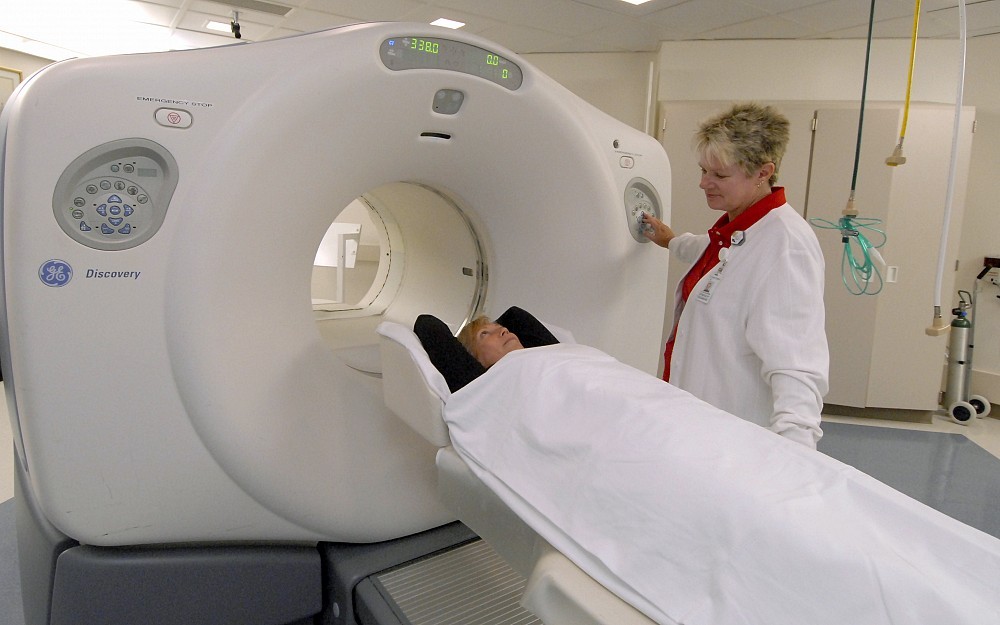
UC Health University Hospital Achieves Quality Accreditation for All Imaging Services
CINCINNATIUC Health University Hospital-based imaging services have received accreditation from the American College of Radiology (ACR) for all types of diagnostic imagingan honor UC Health holds exclusively in the Cincinnati area.
"ACR accreditation is a guarantee to patients that they will receive the benefits of unprecedented quality in imaging equipment, highly trained personnel and a stern quality control program, says Arthur Ray Morton, the senior medical physicist at University Hospital who led the accreditation review.
The accreditation applies to imaging services at University Hospital as well as two outpatient imaging centers located on the University of Cincinnati campusthe UC Health University Hospital Imaging Center and UC Health Varsity Village Imaging Center. Services include mammography, breast ultrasound, stereotactic breast biopsy, computed tomography (CT), magnetic resonance imaging, breast magnetic resonance imaging (MRI), nuclear medicine gamma cameras, positron emission tomography (PET) and ultrasound.
The Food and Drug Administration requires that all facilities providing mammography be accredited by the ACR to receive certification under the Mammography Quality Standards Act. Outpatient imaging centers offering advanced imaging modalitiesincluding nuclear medicine, MRI, PET, and CTmust achieve ACR accreditation by January 2012 in order to comply with the Medical Improvements for Patients and Providers Act. Accreditation for all other imaging modalities offered in a hospital setting is voluntary.
University Hospital was the first ACR-accredited breast imaging Center of Excellence in Cincinnati. It remains the only facility in Cincinnati accredited for breast MRI.
"This is not only about giving the best care. Its setting standards for the physicians, the technologists and the physicists that support the program to ensure those care expectations are met, if not exceeded, says Morton. "They have minimum accreditation, training, and continuing education requirements. This sets the standards for care.
ACR accreditation is a continual process and imaging facilities must reapply for the accreditation every three years. ACR-accredited facilities must maintain defined standards for the full three-year accreditation, and then go through the entire process again after the accredited term.
"The ACR sets a high threshold for qualityeverything from daily calibration to radiation dose exposure in each modality must adhere to the ACRs standards, adds Michael Regg, clinical operations manager for the University of Cincinnati Physicians radiology practice.
"When patients see the ACR accreditation seal, they know that that the site has met very high standards for equipment, personnel, and quality of images, adds Jannette Collins, MD, Ben Felson Professor and Chair of Radiology at the UC College of Medicine.
For more information on UC Health imaging centers, visit ucphysicians.com.
* This story was written by Perry Simpson, an intern in the AHC Public Relations and Communications Office.

A patient undergoes an imaging test at UC Health University Hospital.

Jannette Collins, MD, will serve as chair of the UC College of Medicine s radiology department beginning Feb. 1, 2009.
Related Stories
Ohio could soon make breast cancer screenings more affordable
May 9, 2025
The University of Cincinnati Cancer Center's Ann Brown was featured in Local 12 and Cincinnati Enquirer reports on a bill introduced by Rep. Jean Schmidt in the Ohio legislature that seeks to eliminate out of pocket medical expenses such as copays and deductibles associated with supplemental breast cancer screenings.
Preparing students for artificial intelligence in education
May 8, 2025
Laurah Turner, PhD, associate dean for artificial intelligence and educational informatics at the University of Cincinnati's College of Medicine, recently joined the For The Love of EdTech podcast to discuss the usage of personalized learning and AI coaches to enhance educational experiences.
UC lab-on-a-chip devices take public health into home
May 8, 2025
University of Cincinnati engineers created a new device to help doctors diagnose depression and anxiety. The “lab-on-a-chip” device measures the stress hormone cortisol from a patient’s saliva. Knowing if a patient has elevated stress hormones can provide useful diagnostic information even if patients do not report feelings of anxiety, stress or depression in a standard mental health questionnaire.
